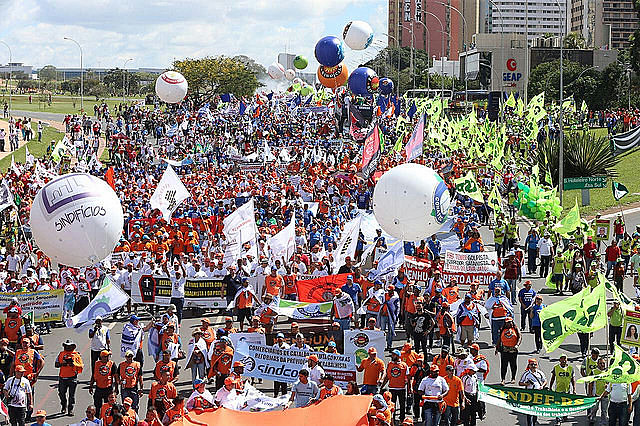Brazil’s most influential trade unions and social movements are anticipating 150,000 people to participate in demonstrations in the country's capital city of Brasilia on Wednesday demanding the immediate resignation of current President Michel Temer along with the call for direct elections.
The protests, which include the participation of various social movements including the Unified Workers Central (CUT), Brazil Popular Front (Frente Brasil Popular) and People Without Fear (Povo Sem Medo), are rejecting President Temer’s recent refusal to step down as head-of-state following the recent corruption allegations.
As part of last minute security measures, the Brazilian Defense Minister Raul Jungmann authorized the deployment of military troops “in order to guarantee law and order” in the Brazilian capital.
The news came shortly after peaceful protesters were met with violent repression by police, firing tear gas and rubber bullets at crowds of people who called for the immediate resignation of President Temer, according to local media reports.
Manifestante é atingido por bala de borracha no olho #diretaspordireitos https://t.co/kNVyvBEKU2 pic.twitter.com/JeyMfxNUZ0— Brasil de Fato (@Brasil_de_Fato) May 24, 2017
Temer’s reluctance to resign came as the Supreme Court released an audio tape last week, which recorded Temer on tape discussing bribes encouraging Joesley and Wesley Batista, two brothers who run the meat-processing company JBS to continue payments to his former ally, Eduardo Cunha, in order to buy his silence, while he was being investigated in the country's largest corruption investigation, Operation Car Wash.
Temer's administration has been embroiled in corruption scandals since it came into power last year after ousting Rousseff in what many both in Brazil and internationally have labelled a parliamentary coup.
According to a new survey, carried out by political risk consultancy Eurasia Group, increased the likelihood that Temer will not finish the remainder of his term from 20% to 70%.
At least ten impeachment requests have already been filed since the hush money scandal broke on May 18.
According to executive national leader from the CUT, Janeslei Aparecida Albuquerque, the demonstrations, are also taking place in efforts to denounce President Temer’s deeply unpopular labor and pension reform proposals.
“We believe that the turnout for today’s protests will be much larger than originally anticipated. This is in part due to the fact that legal motions against Temer for his removal have increased. The Brazilian public is waking up with legitimate indignation,” Aparecida stated leading up to today’s the protests.
According to official estimates from official Brazilian security agencies the total number of protesters is closer to 25,000. However, independent figures are not immediately attainable.
Meanwhile, according to Gilmar Mauro, a national coordinator with the Landless Workers Movement (MST) said that protests will be staged across the country and will include a variety of different protest tactics.
“The goal and the hope is that protests will be carried out throughout the country, in all of the departmental capital cities, even though Brasilia is the most important in terms of today’s mobilizations,” Mauro said on Wednesday.
The MST, which is one of the key organizers of Wednesday’s political mobilizations, will also stage road stoppages along major streets and highways in efforts to paralyze mobility across much of country.
“The demand is simple. We want direct elections now,” Mauro added.
In order for direct elections to take place, Brazil’s overwhelmingly conservative congress would need to approve a constitutional amendment in order to authorize elections ahead of those scheduled for 2018. Early polls show former President Luiz Inacio Lula da Silva leading the pack with support from around 25 percent of the voting public, followed by Jair Bolsonaro at 21 percent.




